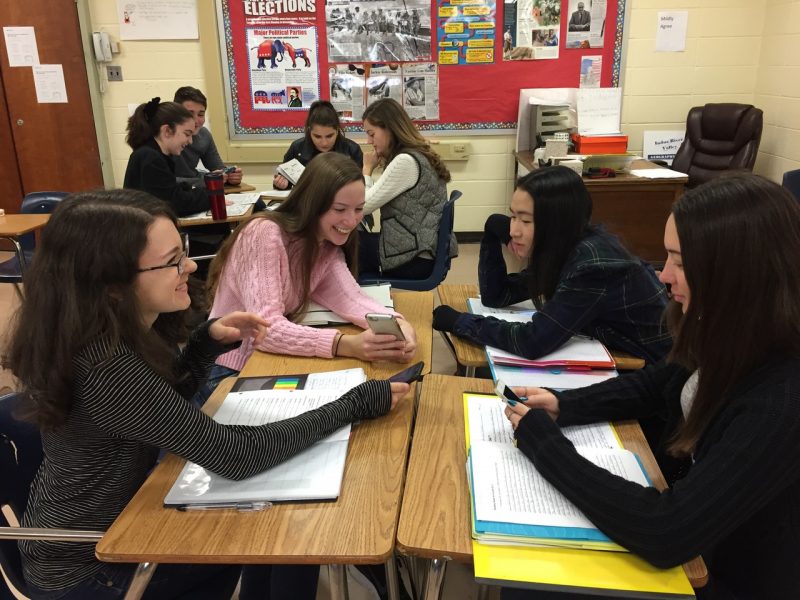What these teens learned about the Internet may shock you!

Can digital media literacy contend with bogus news?

Northport, N.Y., High School seniors (left to right) Hayley Striegel, Olivia Poplawski, Cheri Zheng-Fredericks and Julie Pignataro look for ways to verify information they’ve encountered on social media. Photo: Janis Shachter
When the AP United States history students at Aragon High School in San Mateo California, scanned the professionally designed pages of www.minimumwage.com, most concluded that it was a solid, unbiased source of facts and analysis. They noted the menu of research reports, graphics and videos, and the “About” page describing the site as a project of a “nonprofit research organization” called the Employment Policies Institute.
But then their teacher, Will Colglazier, demonstrated how a couple more exploratory clicks—critically, beyond the site itself—revealed that the Employment Policies Institute is considered by the Center for Media and Democracy to be a front group created by lobbyists for the restaurant and hotel industries.
“I have some bright students, and a lot of them felt chagrined that they weren’t able to deduce this,” said Colglazier, who videotaped the episode last January. “They got duped.”
Or, as one student put it, loudly, “fudge nuggets!”
The exercise was part of “Civic Online Reasoning,” a series of news-literacy lessons being developed by Stanford researchers and piloted by teachers at a few dozen schools. The Stanford initiative launched in 2015, joining a handful of recent efforts to help students contend with misinformation and fake news online—a problem as old as dial-up modems, but now supercharged by social media and partisan news bubbles. The backers of these efforts warn that despite young people’s reputation as “digital natives,” they are woefully unprepared to sort online fact from fiction, and the danger isn’t just to scholarship but to citizenship.
Stanford’s myth busters, led by education professor Sam Wineburg and doctoral student Sarah Cotcamp McGrew, have field-tested 15 news-literacy tasks of varying difficulty, with about 50 more in the works. Can middle-school students spot “native advertising” (ads masquerading as articles) on a crowded news website? Can high-school kids check the authenticity of an alarming image posted on Facebook? Will students investigate the sources of controversial claims? Will they seek corroboration? By and large, according to a report the group published last month, the answer in each case is no.
“Overall,” the report concluded, “young people’s ability to reason about the information on the Internet can be summed up in one word: bleak.”
The news literacy initiative is based in the Stanford History Education Group that Wineburg founded in 2002 to train teachers how to use primary sources and help students critically evaluate historical claims. The group also created a free, digital curriculum called “Reading Like a Historian” that’s been downloaded more than three million times, according to Wineburg.
“We live in a world where our library begins with G,” Wineburg said, for Google, and the Common Core’s push for evidence-based reasoning falls flat if students trust everything that pops up in their Google search results.
Even before a deluge of fibs and fakery swamped our recent election cycle, Wineburg and company realized that readers of online news need many of the same skills used by a good historian, such as identifying the sources of claims and asking questions about their evidence. After all, what shows up in your Twitter or Facebook feed can come from anywhere, and a post-election BuzzFeed analysis suggested the fake stuff spreads faster than real news, thanks to hyper-partisan readers blindly sharing sensational headlines.
“This isn’t just a problem with kids,” said Wineburg. “Reliable information is to democratic functioning what clean air and water are to public health.”
Fortunately, long-neglected civics education seems to be on the rebound in many states, which has helped groups like the Center for News Literacy at Stony Brook University get their message into K-12 classrooms. The Center has run a course for undergraduates since 2007 and has since expanded into secondary schools by hosting summer teacher-training workshops and making course materials available online through its Digital Resource Center. In January, they plan to launch a massive online open course (aka a MOOC) called Making Sense of the News: News Literacy Lessons for Digital Citizens.
One early K-12 adopter of the Center’s news-literacy lessons was Janis Schachter, a social studies teacher at Northport High School on Long Island. Schachter took one of the Center’s first summer trainings and has taught Northport’s news-literacy course since 2011 as an elective that meets New York State’s “participation in government” graduation requirement.
“My students are all about social media. They’ve never known life without it, and it’s where they get all their information,” said Schachter. “Whether that information is from a news organization or from your uncle, it all looks the same to them.”
Gradually, Schachter’s students learn how to sort through it all—to check for multiple, informed and named sources, and for claims backed by evidence they can independently verify.
“I tell the kids, it’s not fair that we have to do all this work, but the reality of the Internet is that we do,” said Schachter, who also stresses that students only need to verify news they plan to act on, whether by voting, protesting or just spreading the story by sharing it.
Still, learning news literacy skills is one thing, and the motivation to use those skills is another. If that tantalizing headline in our Facebook newsfeed fits our political outlook, why do the digging that might undermine it?
The fact that so many of us now get our news in partisan online echo chambers sets up “a perfect storm for fake news,” according to Joe Kahne, an education professor at the University of California, Riverside.
In some good news, a new study Kahne co-authored, based on a national survey of young people ages 15 to 27, found that self-reported media-literacy training did make people significantly less likely to believe a factually inaccurate claim, even if it aligned with their political point of view.
Kahne plans to study news-literacy efforts to discover what specific strategies get young people to value facts, whether they bolster their existing beliefs or contradict them. For now, one popular suggestion by news-literacy educators is to tap teenagers’ instinctive aversion to people telling them what to think.
“One of the messages we’ve tried to stress more and more lately with the rise of fake news is this: Do you want to be fooled?” said Jonathan Anzalone, assistant director of the Center for News Literacy. “Wouldn’t you rather make up your own mind?”
This story was produced by The Hechinger Report, a nonprofit, independent news organization focused on inequality and innovation in education. Sign up for our newsletter to get a weekly update on blended learning.






